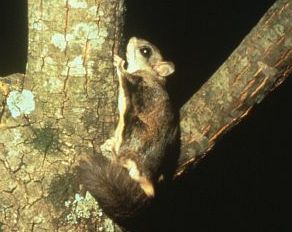
The San Francisco-based Center for Biological Diversity (CBD) filed petitions with the US Fish and Wildlife Service today to protect four mountaintop species from climate change, including the San Bernardino flying squirrel. The CBD is requesting that the species be listed as threatened under the federal Endangered Species Act and that critical habitat be designated.
The San Bernardino flying squirrel is a subspecies of the northern flying squirrel. Historically it has thrived in the high-elevation conifer forests of Southern California, in just two locations: the San Bernardino and San Jacinto Mountains. But according to Shaye Wolf, a biologist at CBD, the species has likely disappeared from the San Jacinto Mountains in the past few decades. Studies indicate that the remaining population is isolated in the San Bernardino Mountains, which is bordered on the north by the Mojave Desert, a formidable barrier to migration.
In its petition (PDF), the CBD argues that as temperatures warm, the squirrel’s habitat is shifting upslope and may eventually become compressed or disappear all together.
“The squirrel has been lost on a sizable portion of its range,” said Wolf. “It’s worrisome that this is the last habitat patch for this species, and there are no options for northward movement and limited ones for moving up in elevation.”
At the same time, drought is threatening the squirrel’s primary food source — truffles. Truffles favor cool, damp environments, which may become rarer as the climate changes.
“As drought increases, there are real concerns that this will lead to a decline in truffle abundance,” said Wolf.
Wolf said the San Bernardino flying squirrel habitat is also threatened by air pollution, certain forest management practices, and development.
The other species the CBD has simultaneously moved to protect are the ‘i’iwi, a Hawaiian songbird; the white-tailed ptarmigan, a grouse-like bird of the Rocky Mountains; and Bicknell’s thrush, a northeastern U.S. songbird.
Earlier this year, the US Fish and Wildlife Service denied a similar petition submitted by the CBD on behalf of the American pika.
“Like the pika, the flying squirrel is showing us that climate change is impacting wildlife in the mountains in our own backyard,” said Wolf.
The U.S. Fish and Wildlife Service has 90 days to determine whether the species may be warranted for listing. If so, the agency has 12 months to make its decision.
